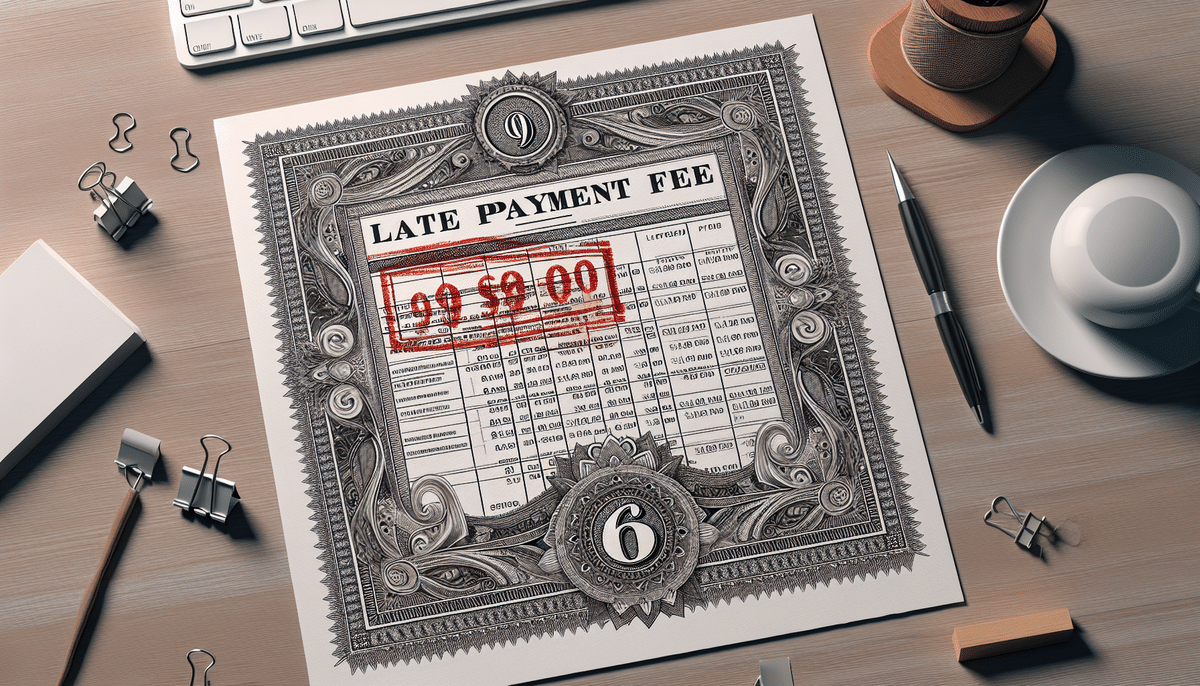Understanding and Managing FedEx Late Payment Fees
For businesses and individuals relying on FedEx's shipping services, encountering a “late payment fee” on your bill can be both unexpected and financially burdensome. This fee, which can accumulate up to 6% of the total amount due, is imposed when an invoice remains unpaid past its due date. In this comprehensive guide, we delve into the intricacies of FedEx's late payment fees, offering strategies to avoid them and manage your finances effectively.
Why Do Companies Impose Late Payment Fees?
Late payment fees are a common practice across various industries, including shipping services like FedEx. These fees serve multiple purposes:
- Encouraging Timely Payments: By applying a penalty for late payments, companies motivate customers to settle their bills on time, ensuring a steady cash flow.
- Covering Additional Costs: Delayed payments can lead to extra administrative work and other expenses, which late fees help offset.
- Deterring Habitual Late Payers: Consistent late payments can strain business relationships. Late fees discourage this behavior, promoting reliability.
Establishing a reliable payment system is crucial for businesses to maintain operations and invest in growth opportunities. Late fees are a tool to uphold this financial discipline.
Breaking Down FedEx’s Late Payment Fee
FedEx calculates its late payment fee based on the outstanding balance and the duration of the delay. Here's how it typically works:
- Rate: 1.5% per month (or a fraction thereof) on the unpaid balance.
- Cap: Up to a maximum of 6% per month.
For instance, an outstanding balance of $1,000 that's 30 days overdue could attract a late fee of up to $60. It's essential to note that these fees can escalate rapidly, especially for larger balances or prolonged delays.
Moreover, consistent late payments can adversely affect your credit score. According to the Federal Reserve, timely bill payments are a significant factor in credit scoring, influencing your ability to secure future credit.
Strategies to Avoid FedEx Late Payment Fees
1. Timely Payments
The most straightforward method to avoid late fees is to ensure your invoices are paid by the due date. FedEx offers various payment options to facilitate this:
- Online Bill Pay
- Electronic Funds Transfer (EFT)
- Traditional Methods: Check or money order
2. Automatic Payments
Setting up automatic payments through FedEx’s billing system can help eliminate the risk of overlooking due dates. This ensures payments are made consistently on time.
3. Budgeting and Financial Planning
Integrate your FedEx payments into your regular budgeting process. Monitoring cash flow can help anticipate and accommodate upcoming bills.
Consequences of Late Payments to FedEx
Failing to pay FedEx invoices on time can lead to several repercussions:
- Accumulating Late Fees: As previously mentioned, these can significantly increase your total payable amount.
- Account Suspension: Persistent delays may result in the suspension of your FedEx account, disrupting your shipping operations.
- Credit Score Impact: Late payments can be reported to credit bureaus, negatively affecting your creditworthiness.
- Collections: In extreme cases, unpaid invoices might be handed over to collections agencies, further complicating your financial standing.
According to a report by American Collections, businesses with unresolved debts are 40% more likely to face operational disruptions.
Alternatives to Paying Late Payment Fees
If you're struggling to meet payment deadlines, consider the following alternatives:
- Financing Options: FedEx may offer financing solutions that allow you to spread payments over a longer period.
- Factoring Services: Companies like Factoring.com purchase your invoices at a discount, providing immediate cash flow.
- Negotiating with FedEx: Reach out to FedEx’s customer service to discuss potential payment plans or fee waivers.
Additionally, always review your billing statements to ensure accuracy. If discrepancies arise, contacting FedEx promptly can prevent unnecessary charges.
Negotiating a Waiver for Late Payment Fees
In certain situations, FedEx may be willing to waive late fees. Here's how to approach the negotiation:
- Early Communication: Contact FedEx’s customer service as soon as you realize a payment might be delayed.
- Professionalism: Maintain a polite and professional demeanor during discussions.
- Provide Context: Explain your circumstances clearly, whether they're temporary financial setbacks or other valid reasons.
Demonstrating proactive efforts to rectify the situation can increase the likelihood of a fee waiver. Implementing measures like automatic payments can also showcase your commitment to timely payments in the future.
The Importance of Understanding Your FedEx Contract
Thoroughly reviewing your FedEx contract is vital to comprehend all associated terms and potential fees. Key aspects to focus on include:
- Payment Terms: Understand the due dates, accepted payment methods, and grace periods.
- Fee Structures: Familiarize yourself with all possible fees, including late payment charges, fuel surcharges, and dimensional weight fees.
- Liability and Insurance: Know the extent of FedEx’s liability for lost or damaged packages and whether additional insurance is necessary.
Being informed about these details can prevent unexpected charges and ensure a smoother business relationship with FedEx.
Common Misconceptions About FedEx Late Payment Fees
Several myths surround late payment fees, leading to misunderstandings:
- “I can ignore the late fee without consequences”: Ignoring fees can lead to increased charges, account suspension, and credit score impacts.
- “Only significant delays incur fees”: Even a single day past the due date can result in a late fee.
- “Late fees are the only additional costs”: Other charges like fuel surcharges and residential delivery fees can also affect your total bill.
Clarifying these misconceptions ensures better financial management and avoids unnecessary penalties.
Best Practices for Managing FedEx Payments
Adopting effective financial management strategies can help you avoid late payments and associated fees:
- Set Up Automatic Payments: Ensure bills are paid on time without manual intervention.
- Regular Account Monitoring: Frequently check your FedEx account for outstanding balances and upcoming due dates.
- Establish Payment Reminders: Utilize calendar alerts or financial software to stay informed about payment deadlines.
- Maintain Open Communication: If financial difficulties arise, proactively discuss options with FedEx’s customer service.
- Understand All Fees: Being aware of all potential charges helps in accurate budgeting and financial planning.
Implementing these best practices fosters a reliable payment history and strengthens your business relationship with FedEx.
Conclusion
Managing FedEx late payment fees is crucial for maintaining financial health and a positive business relationship with the shipping giant. By understanding the fee structure, implementing effective payment strategies, and maintaining open communication with FedEx, you can avoid unnecessary charges and ensure seamless shipping operations. Staying informed and proactive is key to navigating and mitigating the impact of late payment fees.






















